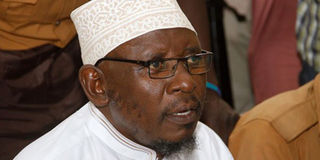Court of Appeal overturns the conviction of terrorism for Sheikh Kamoga

Sheikh Yunus Kamoga had been sentenced to life imprisonment by the International Crimes Division of the High Court in 2017. PHOTO | FILE
By Veronica Kayaga
The Court of Appeal has set free former Tabliq Sect leader, Amir Umar Mohammed Yunus Kamoga and five others who had been sentenced to life and 30 years imprisonment respectively in August 2017.
Sheikh Kamoga and his co-accused had been convicted of verbal terrorism that allegedly led to the death of two muslim clerics, Mustafa Bahiga and Hassan Kirya, and the attempted murder of Sheikh Haruna Jjemba.
Three Justices of the Court of Appeal led by Chief Justice Alfonse Owiny Dollo have ruled that the prosecution had not proved this case beyond a reasonable doubt because acts of terrorism must have an ingredient of indiscrimination in them, which they have not found in this case.
The Justices also observed that none of the prosecution witnesses presented in the High court attended the meetings where the alleged characters staged the crimes they were accused of, and neither do the fliers that had the targeted names convey any message to murder or any intent of terrorism.
Kamoga was jointly convicted with Sheikh Siraje Kawooya, Sheikh Murta Mudde Bukenya, Fahad Kalungi, Yusuf Kakande and Abdul Salam Sekayanja.
The court sentenced Sheikhs; Kamoga, Kawooya, Bukenya and Kalungi to life imprisonment while Kakande and Sekayanja were to spend thirty years in prison.
The group was part of 14 men acquitted of murdering Sheikh Mustafa Bahiga and Ibrahim Hassan Kirya and attempted murder of Sheikh Haruna Jjemba.
Three Judges of the Lower court of the International Crimes Division had held that under the terrorism charge, the convicts indiscriminately terrorized and maimed Sheikh Haruna Jjemba, Najib Ssonko, Bahiga, Umar Swadiq, Kirya, Mahmood Kibaate and Prince Kassim Nakibinge.
Court of Appeal Deputy Registrar Mary Babirye delivered the court ruling of behalf of their Lordships.
Defence Lawyers and relatives to the freed Muslims welcomed the court ruling and said they will wait for instructions from their clients on whether to sue for malicious prosecution.




